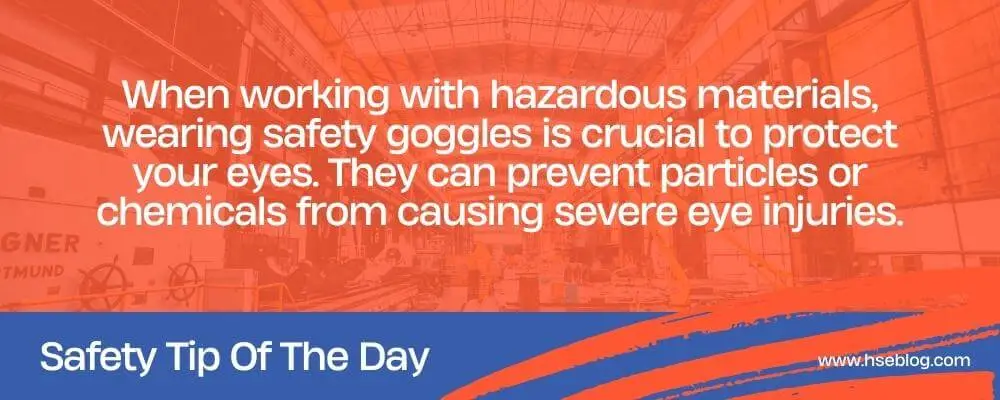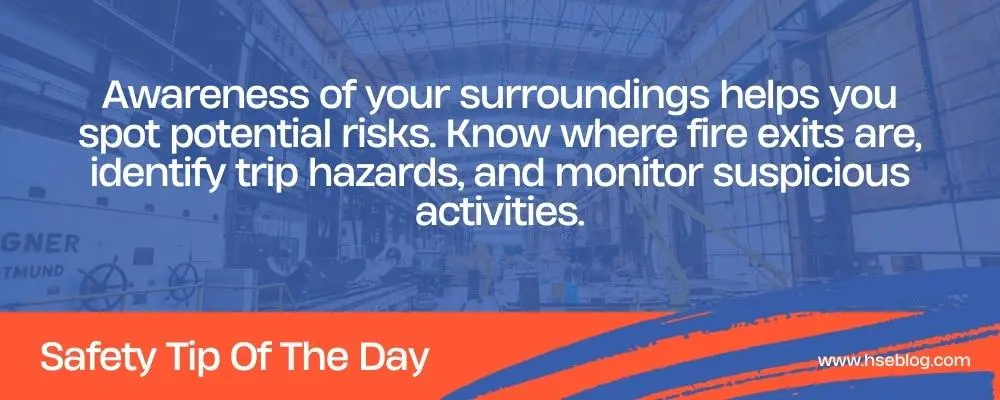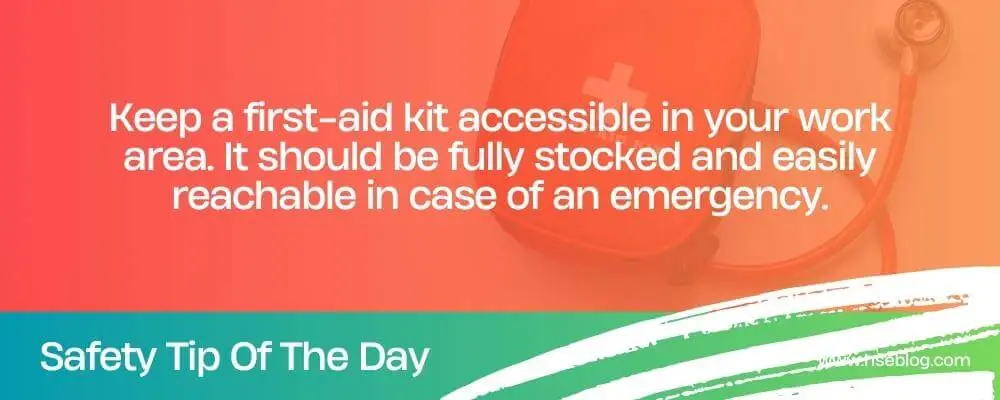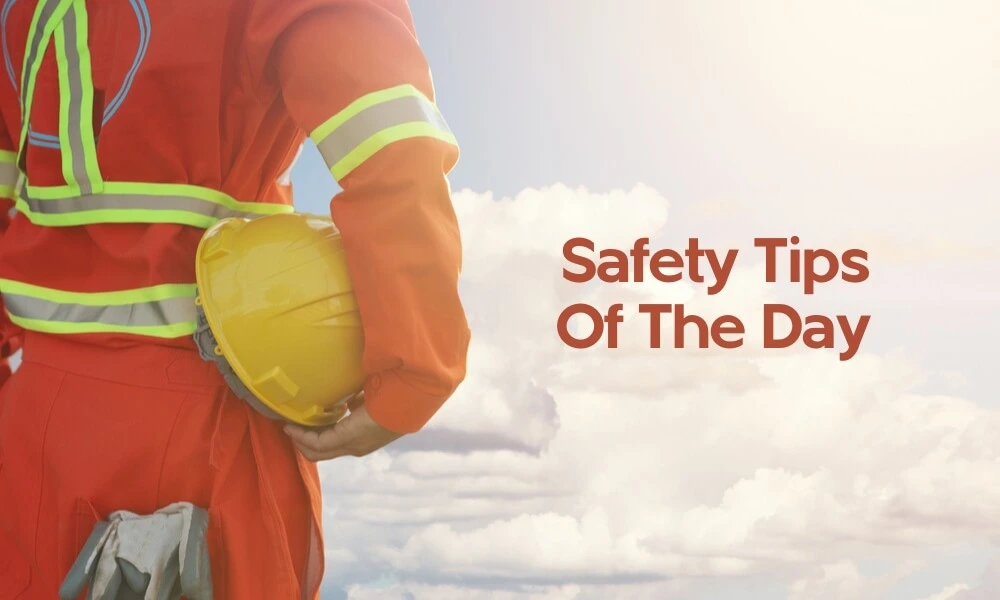Navigating daily life, we move through various environments, each with its unique set of potential hazards. Our guide provides practical, easy-to-implement safety measures that cater to this diversity. From industrial workplaces with complex machinery to the more benign office settings and the comfort of our homes, these tips equip you with the knowledge to maintain safety regardless of the context. Through detailed pointers on handling hazardous materials, keeping clutter-free spaces, or understanding electrical safety, we provide comprehensive coverage on numerous topics that can mitigate risk in any environment.
The aim of this guide is to create an ecosystem where safety becomes a habit that’s seamlessly woven into our daily routines. These 70 Safety Tips, with in-depth elaboration on each, focus on everything from fire and chemical safety to first-aid procedures. Whether you’re an industrial worker, an office employee, or seeking to enhance safety in your personal space, this guide serves as a multifaceted compass, offering practical solutions for a safer day every day. With these tips, let’s foster a safety culture, transforming each day into a safer one, one tip at a time.
70 Safety Tips Of The Day | Daily Dose Of Safety
Safety Tips of the Day is a daily reminder to prioritize safety and well-being. These tips provide practical guidance to ensure a secure environment for everyone and reduce the risk of accidents or injuries. By following these tips, individuals can create a safety culture and maintain a productive and healthy work environment. Here are some valuable safety tips to keep in mind:

10 Detailed Industrial Workplace Safety Tips:
- When working with hazardous materials, wearing safety goggles is crucial to protect your eyes. They can prevent particles or chemicals from causing severe eye injuries.
- Adherence to safety procedures while using power tools is essential. This includes reading and understanding the instructions, wearing appropriate personal protective equipment (PPE), and maintaining good-quality tools.
- A tidy work area is a safe work area. Keeping the workspace clear of clutter and trip hazards minimizes the risk of accidents from slipping, tripping, or falling.
- Speed can lead to accidents. Avoid rushing or running in the workplace. Walk mindfully and be aware of your surroundings.
- Use proper lifting techniques to prevent back injuries when moving heavy objects. Bend at the knees, not the waist, maintain a straight back, and hold the object close to your body when lifting.
- Keep jewelry, loose clothing, and long hair away from machinery. These items can get caught, leading to potential injury.
- Don’t eat or drink hazardous materials. Contaminants can easily transfer to your food or drink, leading to the ingestion of hazardous substances.
- If you observe any unsafe conditions, report them immediately to your supervisor. This allows for quick action to rectify the issue and prevent accidents.
- Wear appropriate clothing and PPE for the job. This could include high-visibility vests, steel-toe boots, gloves, or hard hats, depending on the nature of your work.
- Regular breaks are important to maintain focus and productivity. Also, staying hydrated helps prevent fatigue and heat stress, especially when working in hot environments.

5 Expanded General Office Safety Tips:
- Awareness of your surroundings helps you spot potential risks. Know where fire exits are, identify trip hazards, and monitor suspicious activities.
- Protect your personal belongings. Don’t leave your items unattended to prevent theft or misuse.
- Use handrails and be attentive when using stairs. Wet or cluttered stairs can be a major trip hazard.
- Working alone in a dark room can make you susceptible to accidents. Always ensure your work area is well-lit.
- Any unsafe condition should be reported immediately to the management. This will ensure the necessary safety measures are put in place.

5 Explained Electrical Safety Tips:
- Overloading outlets can cause overheating and fire. Plug only one high-wattage appliance into each outlet at a time.
- Heat sources can damage electrical cords, causing them to melt and expose wires. Keep cords away from radiators, stoves, and other heat sources.
- Always inspect cords for signs of damage before using. A damaged cord can lead to electric shock or fire.
- Running cords under rugs or mats can cause the wire to overheat and lead to a fire. Moreover, this might result in a trip hazard.
- Plugs should fit outlets snugly. Loose plugs can create a dangerous level of heat.
- Use caution when plugging in and unplugging devices. Grab the plug—not the cord—when unplugging an appliance.
- Overloading circuits can cause them to trip and even cause a fire. Distribute appliances across different circuits where possible.
- When appliances aren’t in use, turn them off and unplug them. This can prevent overheating and conserve energy.
- Any frayed or damaged cords should be replaced immediately to prevent accidents.
- If you’re unsure about an appliance’s safety, refrain from using it until it’s inspected or replaced.

10 Expanded Fire Safety Tips:
- Familiarize yourself with the fire evacuation plan. Know the quickest and safest way out in case of a fire.
- Knowing the location of the nearest fire exits helps you escape quickly in emergencies.
- Keep exit routes unobstructed to ensure a smooth evacuation during emergencies.
- If there’s a fire or other emergency, report it immediately to the proper authorities.
- Fighting a fire should be left to trained professionals. Untrained individuals can risk their own safety and potentially make the situation worse.
- Only use a fire extinguisher if you have been properly trained.
- Keep combustible materials away from heat sources. This can prevent accidental ignition and subsequent fire.
- Smoke detectors and fire alarms are vital for early detection of fires. Make sure they are installed and functioning properly in your workplace.
- Regular testing of smoke detectors and fire alarms ensures they are in working order and can alert you in case of fire.
- Conduct fire evacuation drills at least once a year to ensure everyone knows what to do in case of a fire.

10 In-Depth Chemical Safety Tips:
- Never eat or drink in the laboratory, as chemicals can contaminate your food or drink.
- Hand hygiene is crucial in a lab setting. Always wash your hands before eating, using the restroom, and leaving the lab.
- Avoid touching your face when working in a lab. You might unknowingly transfer harmful chemicals to your eyes, nose, or mouth.
- Always use PPE, such as gloves, safety goggles, and lab coats, when working with chemicals to prevent exposure.
- Keep chemicals in their original containers to prevent misidentification and clearly label them.
- Never mix chemicals without supervision or knowledge of the potential reactions. This can result in harmful or explosive reactions.
- Store chemicals safely when not used, ideally in a designated storage cabinet with appropriate climate controls.
- Follow all safety protocols when handling and using chemicals. This includes reading the Safety Data Sheet (SDS) for each chemical.
- If a chemical spill occurs, follow the proper safety protocols to clean it up. This may include using specific absorbent materials, ventilating the area, and wearing specific PPE.
- If unsure about any aspect of chemical safety, ask your supervisor or a knowledgeable colleague.

10 Elaborated First Aid Reminders:
- Keep a first-aid kit accessible in your work area. It should be fully stocked and easily reachable in case of an emergency.
- Familiarize yourself with basic first-aid procedures. This includes knowledge of how to treat minor wounds, burns, and other common injuries.
- Ensure your first-aid supplies are not expired. Over time, materials can degrade, and medications can lose their effectiveness.
- Learn how to use the specific items in your first-aid kit. This ensures you can provide appropriate care when needed.
- If you have a minor cut or scrape, clean it and apply a bandage to prevent infection.
- Apply pressure with a clean cloth or bandage for a bleeding wound to stop or slow the blood flow.
- Treat minor burns by running them under cool (not cold) water for several minutes.
- If someone is not breathing, provide CPR if you’re trained. If not, call for medical help immediately.
- If someone is seriously injured, move them only if they are in immediate danger. Otherwise, wait for professional help to avoid causing further harm.
- For serious injuries, get help immediately. Call the emergency services or direct someone else to do so.

10 General Safety Tips:
- Stay Alert: Fatigue and distraction can lead to accidents. Ensure you’re well-rested and focused while working.
- Communicate: Always communicate effectively and clearly about potential hazards and safety procedures.
- Use Equipment Properly: Only use machinery or equipment you are trained to operate.
- Mind Your Posture: Correct posture can prevent a variety of musculoskeletal problems. Keep your feet flat on the floor and your back supported when seated.
- Practice Good Hygiene: Regular handwashing can prevent the spread of diseases.
- Be Prepared: Keep emergency phone numbers easily accessible.
- Respect Warning Signs: Always adhere to warning signs such as wet floor signs, out-of-service signs, or signs indicating dangerous chemicals.
- Stay Fit: Regular exercise can help you stay physically fit, reducing the risk of injury.
- Handle Sharp Objects Correctly: Always carry pointed or sharp objects facing downwards.
- Limit Noise: Excessive noise can cause hearing problems and increase stress. Use ear protection where necessary.

10 General Home Safety Tips
- Smoke Detectors: Install smoke detectors on every home floor and test them regularly to ensure they work correctly.
- Carbon Monoxide Detector: If you use gas for heating or cooking, install a carbon monoxide detector to alert you to dangerous levels of this colorless, odorless gas.
- Fire Extinguishers: Keep a working fire extinguisher in your home, and ensure all household members know how to use it.
- Escape Plan: Have a fire escape plan and practice it regularly with all household members.
- Electrical Safety: Don’t overload power outlets. Keep all cords and outlets in good condition, and replace any frayed or damaged ones.
- Safe Storage: Store all cleaning supplies and medications out of reach of children and pets.
- Secure Entrances: Make sure all doors and windows can be securely locked. Consider investing in a security system.
- Slip Prevention: Use non-slip mats in your bathroom and shower to prevent falls.
- Clutter-Free: Keep your home clutter-free to reduce trip hazards and potential fire risks.
- Food Safety: Ensure food is stored and cooked at safe temperatures to prevent foodborne illnesses. Regularly clean your refrigerator and pantry to avoid the growth of harmful bacteria.
Conclusion
Safety, often overlooked until it’s too late, forms the core of our day-to-day lives. Our comprehensive guide provides a robust set of guidelines to safely navigate various environments. As you incorporate these recommendations into your daily routines, remember that safety is not just about avoiding hazards but about cultivating mindfulness, proactive behavior, and a keen awareness of our surroundings.
Let this be a stepping stone in fostering a safety culture within and around us. After all, a safe environment is not just a necessity but a right; with these tips at hand, we are all well-equipped to make each day safer.

